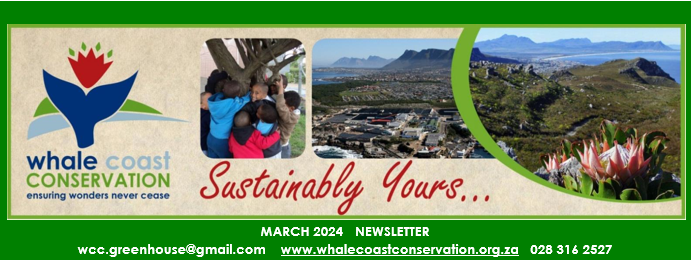
IN THIS ISSUE
- Stanford Mill Stream – Water Testing
- Hawston Paddavlei Project
- Alien Clearing at WCNR Chameleon Sanctuary
- River Restoration Day
- Public Talk in April
Stanford Mill Stream – Water Testing
The Mill Stream Project at Stanford has been running an experiment on the stormwater discharge channels. The idea is to filter polluted stormwater before it discharges into the stream. This involved the installation of gabions, small reed beds and lily ponds. Once set, incoming and outgoing water was tested. This is currently done on a weekly basis by Thembisile Mangali, overseen by Sheraine van Wyk. The tests are done on samples of water to monitor the level of chemicals like nitrates, phosphates and dissolved oxygen.
The test results have unfortunately not shown a marked decrease in these chemicals yet and the experiment design is being altered as are the water testing techniques.
Hawston Paddavlei Waste Project
The Paddavlei project kicked-started with a community survey of the waste management issues in Hawston. The survey has shed some light on some of the issues pertaining to illegal dumping in the Paddavlei.
The results of the survey (which surveyed 5% of the population) showed that most people know about the facilities such as the Hawston drop-off station and weekly bin refuse collection but many do not use the services offered at the transfer station. The main reason for this is the lack of transport. The survey also showed that many people do not know about hazardous waste, electronic waste and that some waste can be taken to the recycling station in Hermanus instead of being dumped or going to the landfill site.
Alien Clearing at WCNR – Chameleon Sanctuary
The Alien invasive plants are a major threat to biodiversity! They deplete our valuable underground water resources and they provide fuel for intense and prolonged veld-fires. There is an ongoing need to clear alien invasive vegetation so that indigenous fynbos vegetation may be restored. Thank you to ALL THE VOLUNTEERS who continue to work at the Chameleon Sanctuary in Whale Coast Nature Reserve where a total of 101 239 alien invasive plants of all sizes were hand-pulled in 3 years between 2020 and 2023.
After each season’s sunshine and rain, the cleared open spaces have been showing surprising differences. We are seeing more fynbos plants and fynbos creatures and pollinators are making a come-back!
Now in 2024, we will need plenty more HELPING HANDS to pull out any further regrowth of alien invasive vegetation! We guarantee that the free exercise is invigorating! With the bonus of knowing that you are giving nature a helping hand. We use the effective tree-popper tools for alien clearing making it relatively easy. The work is 100% satisfying as we achieve our weekly alien-clearing targets together as a team. Firm friendships are formed in the field as we share informative conservation conversations.
Bring a friend or two and join us on any WEDNESDAY at 8.30AM at THE GREEN HOUSE – wear suitable outdoor clothing and remember to bring drinking water and a healthy snack to sustain you!
The photo on the left shows the regrowth of Restios after alien invasive plants were cleared in 2021, making space for indigenous regrowth.
River Restoration Day
The Western Cape region faced quite a year in 2023, with extreme weather events leaving a lasting impact. Among the areas heavily impacted was the Botriver region in the Overberg. The river’s relentless force eroded its banks, wreaking havoc on infrastructure, croplands, river banks and triggering landslips along the hillsides. These natural events pose significant challenges for local communities, leaving landowners grappling with the aftermath and seeking assistance.
In response to the urgent need for help, the Diepklowe Conservation Trust and De Rust Conservancy drew on their relationship with CapeNature through the protected area network. Together, they initiated a dialogue,
seeking advice and assistance for the damage inflicted upon landowners during the devastating flooding events. The goal was clear: to explore effective mitigation strategies and restoration efforts.
On February 22, 2024, a collaborative effort unfolded as multiple organizations came together to host a River Restoration Day at the beautiful Porcupine Hills Guest Farm. The event attracted a diverse group of stakeholders 24 landowners, 19 Partners and Officials; Representatives from various organizations and government bodies.
Key note issues discussed were: Climate Change and Risk Assessment, Landslip Management and Restoration Options, Field Advice and Practical Insights, Flood Damage Assessment. The River Restoration Day highlighted the need for collective action and we hope that this day enabled the answers to many questions as well as resilience for restoration.










